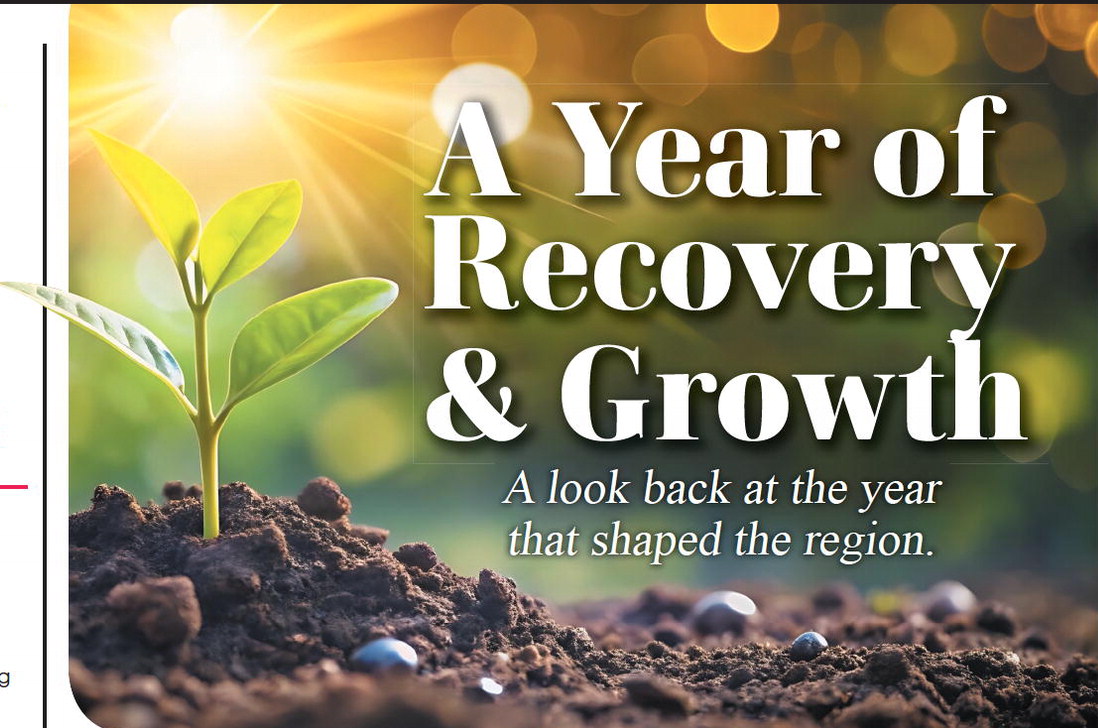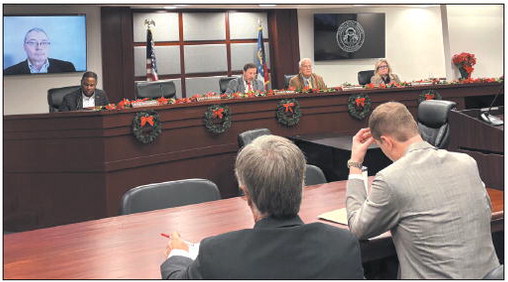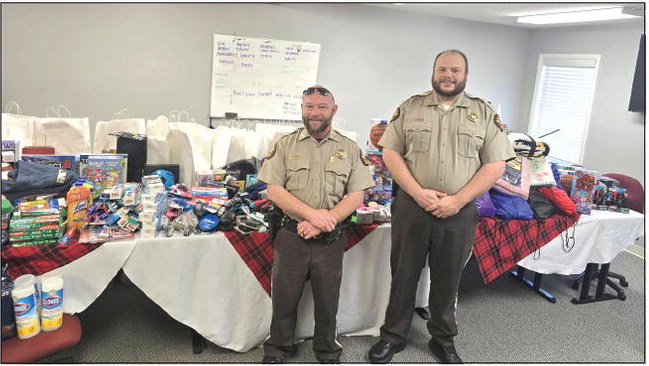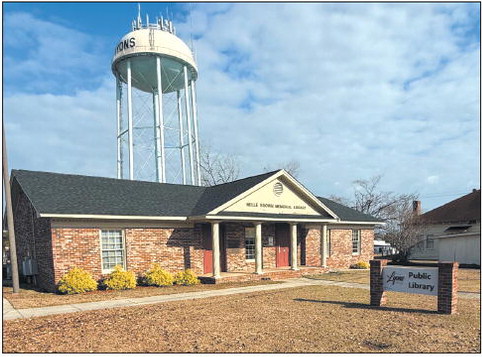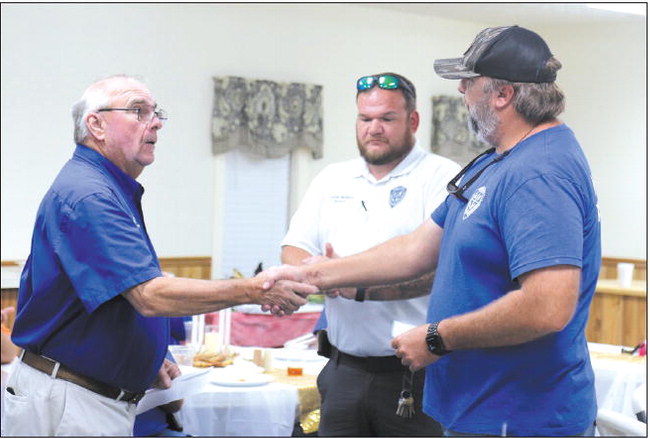The Power of Humanity
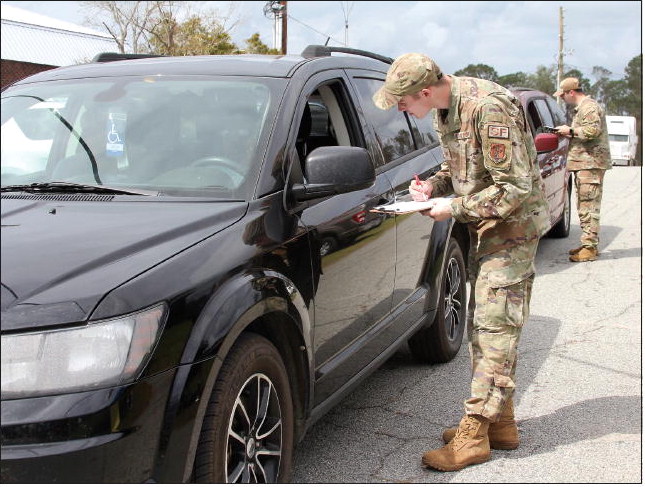

Wheeler Weathers the Storm with Help from Far and Wide
Even in the face of their own misfortunes, people find a way to pivot around personal loss to help others. This has been the case throughout the South Georgia area and elsewhere where communities have been devastated by Hurricane Helene.
In Alamo, Leslie Adams Harrell, who was working the command post set up at the county’s Community Center, had just come through a harrowing experience at her own home. A tree had pierced the roof of her house, three vehicles parked in her yard had been heavily damaged, and her air conditioner was ruined — yet she was focused on volunteering to help others.
She turned up again in the county’s other municipality at Glenwood to assist in handing out supplies and donations.
After the storm, local plumbing company owner Matt Davis helped Glenwood residents with plumbing issues, and did not charge for his services.
He also unloaded and organized supplies donated by churches, organizations, and individuals from the area, across the state, and even outside the state. He was also among those who cooked hot meals to feed the hundreds of people who flocked to Glenwood after the storm. They came from not just within Wheeler County, but from Mount Vernon and Ailey in adjacent Montgomery County, Soperton in adjacent Treutlen County, and beyond.
Outside the Command Center in Alamo, Mervin Barberee, who owns restaurants in Helen and Cleveland, set up his grill and offered free hotdogs and hamburgers to volunteers and members of the National Guard. He was assisted by folks from Cordele and Cedartown who were helping to plate and serve the food. The Cedartown group included four men who came down armed with chain saws for cutting trees and clearing debris.
At the Senior Citizens Center in Alamo, Wheeler County Tax Commissioner Kim Clark was solidly in the roll of volunteer as she helped direct the intake and dispensing of donated supplies. At the Center, many of the county’s officials rolled up their sleeves to unload donations from communities like Lake Blackshear, Dublin, Athens, and Atlanta, and elsewhere.
Others took supplies to people who were not able to pick them up. Some at the center were busy collecting the clothing of linemen and National Guard troops to wash and return for another day’s duty.
“I don’t remember ever seeing anything like this in my lifetime. Wheeler County has never been hit like this before; a lot of communities have never been hit like this before,” said Wheeler resident and GBI Inspector Eve Rodgers, whose entire family was also volunteering. “But early on after the storm I saw how people were pulling together and trying to help one another. People were coming to Wheeler County from all over the state, even outside the state. It has been amazing.”
Two Killed in Storm
The hurricane took a toll in human lives. Wheeler County was not spared.
Glenwood Volunteer Fire Chief Amber Wommack weathered the hurricane in the city’s fire station after answering an emergency call late Thursday night.
She and other first responders had rushed to a location on Georgia Highway 19 at Adams Cemetery Road where two people died after a tornado hit their mobile home. “When we arrived, we didn’t even know what we were looking for.
The 911 call was a 10-50 (wreck),” Wommack said, explaining that a woman who had apparently been inside the home when the tornado hit was found next to an overturned vehicle near the highway. She was evacuated for medical treatment, but her injuries were not critical.
Only after neighbors arrived on the scene did first responders begin to gain perspective. The neighbors near the mobile home, whose own houses had not been impacted by the tornado, were able to inform emergency personnel about the trailer’s occupants. At first, emergency crews believed they were also looking for two children, as well as two adults.
The mobile home had disintegrated, with debris scattered over a field, and that is where the bodies of a woman and a man were discovered. The children were safe at another location.
When Wommack returned to the station, the winds from the hurricane were blowing full force and she was not able to get back home. She spent the next several hours at the fire station, and it was a harrowing experience. “I crawled beneath a picnic table inside the building and put on my fire helmet. We could hear the wind picking up the roof of the station.”
For John and Bette Davis, whose two-story home is situated adjacent to a massive pecan tree orchard on Highway 19, the early morning hours when the storm ravaged the county were unforgettable. They huddled together inside an interior hallway on the second floor of the house, with doors to bedrooms closed. Deanna, John’s daughter, was in another section of the house connected by a breezeway, but the Davises could not force the door open to check on her because the winds were too strong. They could hear glass shattering as the winds from the hurricane smashed windows.
After the storm died down, Deanna emerged from the east wing of the house, which had held together well during the storm. She was unharmed.
When the Davises ventured out the next morning, the pecan orchard had been mowed down by the winds.
Only a few trees were left standing. The landscape has been forever changed, but their historic home, built in the late 1870s, still stood.
The Davises lost their entire pecan crop—over 1,000 trees—a 150-year-old barn, and some other structures, but they were just grateful they survived.
Down the road about three miles from the Davis home is historic Shiloh Church, which was built soon after the Davis house was completed and dedicated in 1886. There, most of the longleaf pines surrounding the church were down, but the historic church with its stained glass windows, was intact. The adjacent annex was heavily damaged, however, when a tree fell across a main beam. The church was planning to hold its annual homecoming later in October, but that event has been postponed indefinitely.
Digging Out, Getting Help On Friday morning after the storm, disoriented residents were digging out, trying to set up generators — if they had them — and trying to find fuel to run the generators and their vehicles. Georgia Highways 19 and 126, and U.S. Highways 280 and 441, were blocked by trees and debris, and these roads had to be opened first. In the 300-square-mile, largely rural county with scores of dirt roads, many residents had to cut their way out to reach the major highways.
Initially, it was incumbent on the residents to assemble whatever equipment they had to open these major pathways. In some cases, it was just residents armed with chain saws who were cutting and throwing limbs off roads, and putting to work backhoes and tractors from their farms. Local loggers, joined by the local Georgia Forestry team, brought in heavy equipment to clear the roads. There were perils everywhere with trees and power poles snapped off or leaning precariously.
At first, 100% of the county was without power. Georgia Power handles power for the county’s two municipalities, while Little Ocmulgee EMC, based in Alamo, serves the rest of Wheeler, parts of Laurens, Dodge and Telfair counties. While power was restored to the county seat at Alamo early in the week, other areas of the county would have to wait while the legions of linemen made their way into the county’s interior after the National Guard came in to make the county’s roads safe. Into the weekend following the hurricane, linemen were still working diligently to restore power.
Wheeler County EMA Director Steve Adams and his wife, Elizabeth, who live on a dirt road in the little community of Spring Hill, were completely blocked in by trees in the first hours after the storm. Their first contact with the outside world was with their son, Michael, who drove in on his side-by-side to check on his parents. He lives a mile and a half away, and it took him one and a half hours to get to his parents. It would require a backhoe and tractor and two days to clear a route out of the community. “We were trapped. There were so many trees down, and there was no cell service. We could not even contact our children to see if they were all right,” said Elizabeth.
Adams, who would be directing search and recovery operations, was desperate to get to the City of Alamo and establish a command post. On Sunday, he connected with the Georgia Emergency Management Agency (GEMA) to initiate relief operations, and GBI Inspector Eve Rodgers, who lives just outside of Alamo on Highway 126, assumed the responsibility of assistant post commander. “It was just too much for one person to try and coordinate,” she said. At that point, the task was to notify GEMA’s State Operations Center in Atlanta and to request aid. The SOP’s role is to facilitate requests made by the counties through their county EMA Directors and then expedite assistance to these counties.
Help soon began to arrive in the form of additional GBI personnel, the Department of Natural Resources, the Georgia State Patrol (GSP), GEMA, additional Georgia Forestry employees, the National Guard, the Department of Community Supervision, and many others. Local law enforcement — Alamo Police and the Wheeler County Sheriff’s Office —and the county’s five volunteer fire departments were active from the beginning, and personnel from the municipalities and the county government were out in force, as well.
Once communications were restored, volunteers poured in to set up an information center at the command post where residents who were in need of immediate help could call in for assistance. On Monday, an emergency Facebook page (Wheeler County Emergency Support) was set up, where information was dispersed about incoming supplies. Inspector Rodgers’ daughter, Rylin, was instrumental in establishing and maintaining the website.
Outpouring of Support
Janie Towns Dixon was among the volunteers at the Command Center whose tasks included taking calls for assistance and sorting and assigning offers to help. She said volunteer groups brought skid steers, tractors, chain saws, and excavators. “When I was worried about tarps and asking our group to say a prayer, 10 minutes later a man was standing in front of me saying, ‘Hey, I do tarping. What can I do to help you?’” She said when skid steers were needed, they miraculously arrived. “We had three come in after I sat down in this chair this (Friday) morning. We were not expecting them. The Lord has provided consistently whatever we needed.” She related that when a group of volunteers was working to clear debris in a Glenwood neighborhood and needed a meal, a resident using a propane cooker to fry fish invited the volunteers to the makeshift table. The household had no power, but the outside scene was lit by headlights from cars parked at the home.
There are many stories of kindness from strangers and an outpouring of love from Wheeler’s former residents who returned home to help. Karen Nicholson, a former resident now living in South Dakota, took a flight to Atlanta and enlisted the help of a friend to bring supplies to her hometown. Mindy Smith, an attorney now living in Atlanta, returned to her hometown to help. So did Lisa Cox Clark of metro-Atlanta, whose father is Alamo Councilman Bobby Cox — and so many others. Former residents Kyle and Alanna Woodfin, now living in Hawkinsville, continued from page
brought in meals for those manning the Command Center. He is the former pastor at First Baptist Church of Alamo. Samaritan’s Purse and the Southern Baptist Association signed up to come and help. Dixon said there are so many heroes who have done extraordinary things that people may never know about. She referenced the many GBI agents — on duty and off duty — who drove into sites for search and rescue, bogged down their vehicles, and went on by foot, crawling over downed trees to reach people who were trapped in their homes.
The National Guard arrived “full force” to clear debris from roads, and by Friday, all roads in the county were open, allowing linemen full access to areas needing restoration of power, Adams reported. Members of the GSP, who had arrived to help with law enforcement and response efforts, went door-to-door to check on residents who were known to be homebound or whose homes had been damaged by the storm.
Rodgers related that the Georgia Forestry Commission was instrumental in clearing roads. “They worked around the clock and even before other assistance came in, they were working alongside private citizens trying to clear a path through the destruction.”
On Wednesday and Thursday following the hurricane, a Chinook helicopter from Hunter Army Air Base landed in the county’s recreation center field to offload three shipments totaling 6,000 MREs (meals ready to eat), which were dispersed at the PODs (points of distribution). Shipments of water and ice arrived from Alabama. PODs were established in Alamo and Glenwood where residents could obtain water, food, tarps, and other supplies.
Sadly, an armed robbery in Glenwood and a break-in which occurred in the county prompted a county-wide curfew of 5 p.m. to 8 a.m. daily, but, no other incidents had occurred as of Friday. That curfew was still in effect as of Friday.
As the weekend came, the county was beginning to right itself, but recovery will continue for months, even years. The landscape has truly changed. In Wheeler County, a lot of tree farmers will be dealing with thousands of acres of downed and damaged timber which have to be harvested and hauled to market very soon — even at lower prices — if anything is to be salvaged. Pecan growers who were hoping to begin harvesting their crops soon are documenting losses and looking for federal assistance to help them recover. Farmers, who had cotton and peanuts in the fields which were in the process of being harvested, are also assessing their losses.
State Senator Blake Tillery of Vidalia, who was with Governor Brian Kemp when he visited Wheeler County on October 1, said, “It’s not going to be a fast recovery. The moves we make right now are going to lay out how this recovery works not just for the next few weeks, but the next few months.”
Representative Leesa Hagan of Lyons, who was also with the Governor as he surveyed the area damage said, “Once we assessed the situation we discovered there was deeper damage than we originally thought. I think the long term is going to be a real struggle because we are going to have to rebuild homes and businesses. This has been a setback, but I am hearing consistently that people are pulling together and there is a lot of hope that we will recover and move forward.”
Wheeler County has sustained an unprecedented blow, but the community — and its many supporters — are banding together to work together to recover. A makeshift sign in the window of the Alamo’s Community Center says it all: “#Wheeler Strong #Georgia Strong.”
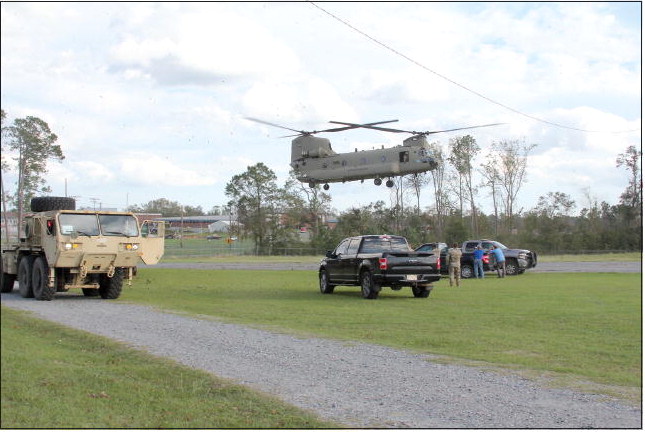
SHINOOK LANDS — Over 6,000 meals ready to eat (MREs) arrived by helicopter Tuesday, October 1, in storm-ravaged Wheeler County. In this photo, a helicopter lands at the County Recreation Center in Alamo.Photo by Deborah Clark
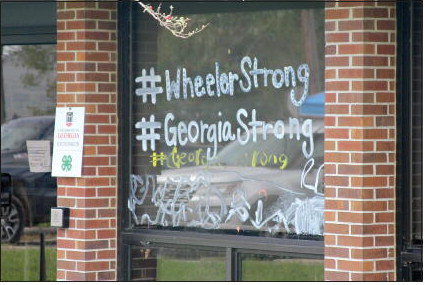
STAYING STRONG — This makeshift sign in the window of the Community Center turned Command Center in Alamo says it all.Photo by Deborah Clark
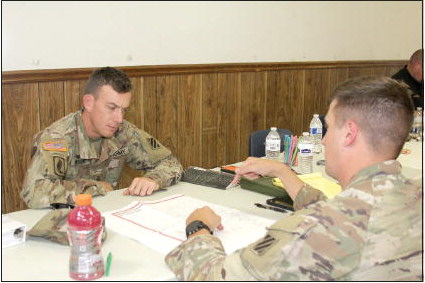
MAPPING THE DESTRUCTION — National Guard Captain Carson Wright of Metro-Atlanta, right, and 1st Sgt. Lee Brinson of Macon study a map of the county. The National Guard arrived on Wednesday to clear debris and open roads in the county.Photo by Deborah Clark



